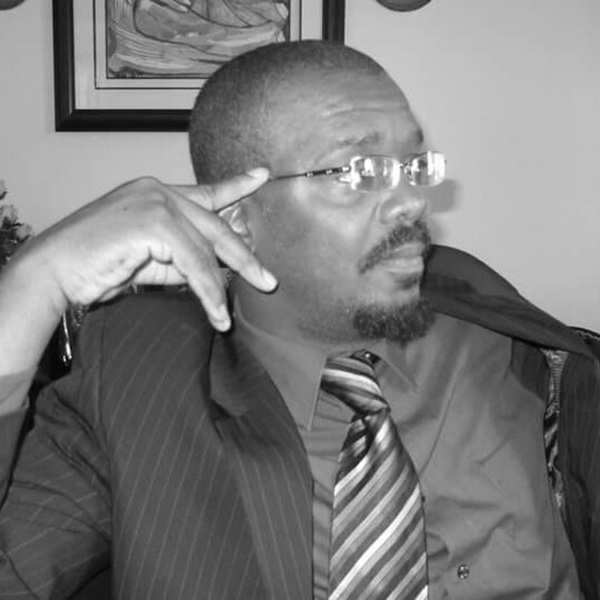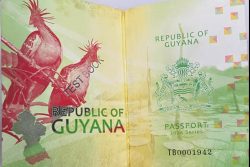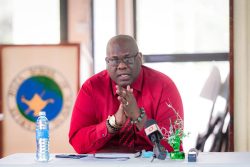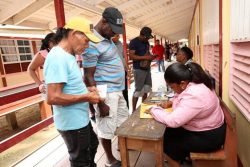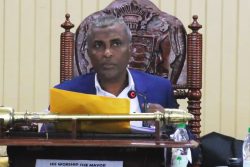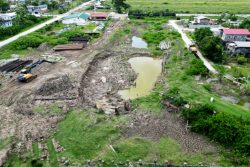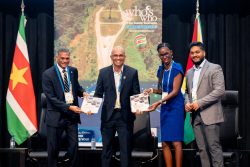Even Sisyphus rested considering a new approach upstairs
Straight up this time this stone all the way to Elysium
But we could not, there was so much to do down here,
The cane the cane-cutting, egged on, the foreman saying, “some
Of you lazy-lazy,” if in pith helmet a high horse driver edging the field
Would remember to us another kind of history, chamars
Bent between stanzas of wavering cane under sun that keels
Their spines, dry their substance like raisins until the stars
Were switched on. This shift, shifting, outlasted a colony,
Work is its own end, ends in more work or no more work to win.
Then comes cursing, drinking, beating of wife, suicide, links on the rosary
Of deadly sins: rum-shop chopping, over-the-paling quarreling.
In the loll, the siesta, our hard worries balloon:
Hungry belly children at bare-foot soccer in the dusty yard
Scream their need; emptiness crams their craw
The beautiful struggle is not beautiful, life is hard.
Berkley Wendell Semple
The Coast
I.
You see them passing the coast
Assaulting your eyes, after miles of rice fields
Say, prisoners of vine, windows broken, stilt-posts
Polioed on a decrepit skyline, the lineal
Patrimony of tenants gone to snow
Countries, or the islands arced stones
Topping waves in the archipelago,
Constant as verandas where customary crones
Tan their dark hides to tar looking out on
Main Road for the future, more behind them than ahead,
Houses, unhinging windows, doors, lintels gone,
Gone the astragal latticework, ants fed
On the wood. Emptiness screams from within.
There is no one there, there is nothing.
II.
Tracing the lineage of your folk ends in shade
Of calabash and sentinels of coconut
Whose knifing fronds and spheres decorate tombs
Whitewashed below, the names do not
Signify who inhabits the silence, save
In memory where a run of blood resembles
Your own; and some older person in a vague
Remembrance stood mouthing the connections,
Saying, “he was the son of your father’s brother
On your mother’s side, Cyril or Caryl, who fell
From a silo in ‘52, broke his neck.” Or “she was
Tantie’s sister’s son daughter, Mavis, a bush whore,
She drowned in Ekereko 1949.” And you, my brother
“Vaughn, thirty-two, septicemia, 2013, Mahdia.”
III.
The grinding tumult of the mill peters to insistent
Silence to men in wee mornings on the koker
Drinking their breakfast of rum. Milling. Silos rust
Above tall trees; dereliction empties the pocket,
Here in this place where choice is starved
for numbers, where millwork once assured minor wealth
Sun golds the early east, the comfort of waking
Without worry, without stress. There is worry now.
Women haggle the fishmonger with new desperation
Wife beating and child beating fray the family, rum
Reasons the humble out of thought; love teeters
The high pinnacle; life traipses the high scaffolds.
All this time had so valued a thing hinged on
Labour of our hands, and when it was gone. . . gone?
V.
For the night is quiet, no wind, the sultry night,
Quiet, treading on padded feet under trees
To your window where shone, far and near, the only light.
Come to the window Simone, list my pebbly
Ping upon the pane, come to the window Simone, come.
Time slips the knots of time, slips the noose, slips
And falls into a hole in the ground, anesthetic and dumb.
I am the night, wears night’s dark and night’s lips,
Speak in crapaud’s croak and cricket thrill and silence,
Speak in silence with lips of trees, with closed
Mouth, cowled, skeletal with cresset waiting, patient
Until dream wakes you, pry lids open, tickle your nose
Shadow glides the Thule of your window blind,
You are night’s catch, night’s mare, and mine.
Berkley Semple
Comfa
(for Leary McKenzie)
Leary knocks the comfa drum at wakes and weddings,
He is dark and his fingers are long. He holds
The drum between his knees and he thumps
Out a comfa on the drawn calfskin. Sometimes he sings.
Sometimes he gets lost in the rhythm of the thing,
The rhythm-ing; his eyes are closed tight and his head
Is still. But his hands move like a blur and he slaps
Something marvelous for the women to take wing
And fly free when they catch comfa, the spirit thing,
The African-ing of our atavistic past. The women lose
Themselves, their arms flail madly and they fling
Themselves wide and near; often there is quiet crying.
Often, I want to lose myself too like these women, fling
Myself from myself. But I am embarrassed to be so free,
Why should I be? I have been known to hold a girl
Close, waltzing on a wooden floor and I can swing,
Man, I can let loose. Leary will drum for hours, showing
No sap of energy, the man going and going, in a trance- like-state.
He is dark and his fingers are long, he smacks
The drum and the women hurl themselves free, freeing
Themselves until there is a sense of heightening,
The dancers and the dance aspire to something else;
Leary knocks, but there is more than beat
In the beating; more than music in the making.
Berkley Semple
The nation of Guyana marked 57 years as a Republic on February 23, and celebrated it, as usual, with the festival of Mashramani. But this time it was enriched by the inclusion of another festival. The Guyana Prize Literary Festival 2023, which is linked to the Guyana Prize, was this year enlisted by the Ministry of Culture, Youth and Sport to add weight, spice and substance to Mashramani. There could have been no better way to celebrate the return of the Guyana Prize after a six-year absence.
Neither could we find a better way to join Guyana in its celebration of postcolonial nationhood than with literature; new Guyanese poetry that builds and defines a nation, and in this case celebrates a nation marking its place as a sovereign state. Even more than that, there is no better way to commemorate the Prize’s return than with the presentation of selections from the Winner of the Guyana Prize for the Best Book of Poetry 2022, Berkley Wendel Semple.
The poems are from Flight and Other Poems, published by Malvern, New York, 2021. Semple is a Guyanese poet resident in the USA, who has had success in this Prize before. He won the Prize for the Best First Book of Poetry with The Lamplight Teller in 2004. His other two collections of poetry are The Solo Flyer (2006) and The Central Station (2020).
Chairman of the Jury Evelyn O’Calaghan, in her citation, described the winning work, Flight and Other Poems as, “A striking collection with a sensitive and sophisticated poetic sensibility, displaying an impressive range of language, poetic dictions and forms, moving easily between the classical and the vernacular. A powerful invocation of Guyanese people, places and memories that reverberate long after reading. There is nothing cloying, sentimental or tedious about these word pictures so deftly stitched together”.
These poems represent the newest voices in 21st century Guyanese literature, which in many ways celebrate or reflect, sometimes in tragic tones, sometimes with humour, but always striking and true, memories of people and places in a Guyana of decades ago. Semple has a strength in his use of language and imagery, which brings those to life; often personal memories, but dramatisations which also speak to the land, with significant references to the village of Burma – the capital of the rice industry.
He is always sensual, often erotic, as in the poem “Two Sisters”, for example, not reproduced here. Semple reflects on girlfriends, lovers and amorous encounters in uninhibited, intense poetic imagery, yet paints pictures of women with admiration, compassion and reverence. His references to Simone, in the poem “The Coast”, for example, express solidarity for an old friend, a teacher in Mahaicony affected by a stroke. “The Coast” takes readers back to the poet’s memories of his former home. It is a recognisable Guyana with rice fields, an old rice mill long gone out of use, preserved images of the landscape and family members.
Semple was born in Calcutta village, Mahaicony, Guyana, and grew up around Burma with its rice industry, and Abary, all still familiar pillars of the coastal frontiers of Demerara/Berbice. He captures the lineage with a vivid sense of place; the men, the rum drinking, the work, the character and the ills of village life.
But Semple is also well known in his poems for classical allusions and references and Standard English with its literary and intellectual sophistication. We get a whiff of it in the poem “History” in which he juxtaposes the classical – the labours of Sisyphus with the labourers in the cane fields of Guyana. Sisyphus of Greek mythology was punished by the gods, condemned to roll a heavy stone up a hillside for eternity. Elysium, also of Greek myth is the desired place of rest, paradise and peace, a place where Sisyphus, and by comparison, the cane cutters, will never reach. The cane cutters are in their worst element – rum drinking, the despicable practice of wife beating, suicide and starving children. In fitting terminology, the poet refers to “chamars” – the lowest of lows in the hierarchy of the Indian caste system, but also a word the workers use to curse each other: a chamar is a worthless, low, disreputable individual.
As an indication of its breadth and depth, “Comfa” is yet another example of Semple’s poetry. It touches on another gem of the Guyanese folk traditions – Comfa (otherwise spelt Kumfa or Cumfa). It is African derived ancestor worship in which rituals are held with music provided by mostly, drums. The drum is a medium for the invocation of deities and spirit possession. Mainly women tend to dance to the kumfa rhythms and become possessed (in Guyanese parlance “ketch de spirit”). Semple revels in vivid, suggestive images once again in his description. Yet he tempers this with a profound understanding of the need for these working women to seek liberation from a harsh and hostile existence in the freedom of the kumfa dance.
This is the quality of Semple’s poetry, a fitting tribute to Guyana as a nation on the anniversary of republicanism.
